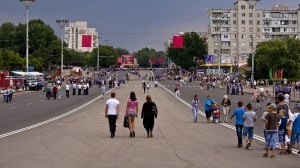Click here to follow Screen Digital on YouTube and stay updated with the latest from the world of cinema.
Indian filmmakers latest fascination is with politics
Politics has begun to provide much food for thought to filmmakers since it affects the everyday lives of people.
The box office may be out of action right now but with the general elections still going on,filmmakers are busy keeping close tabs and lapping up all the information for a possible plot for their films. Indian politics has never failed to intrigue the masses and filmmakers alike. But a renewed passion for the genre is evident as some half-a-dozen films centred on politics are in the making right now.
While Prakash Jhas Rajneeti,which studies the equations of politics and various political parties,is the one most in the news these days,there are others,like Kunal Kohli and Dibaker Bannerjis untitled which are both in scripting or casting stages.
Indian politics has begun to provide much food for thought to filmmakers since it affects the day-to-day lives of people.
Besides,our politics dependence on elements like caste,religion,classes and cultures increases the appeal. Its interesting to bring forward to the audience the unseen facets on politics, says trade analyst Ashok Pandit. Ram Gopal Varmas Sarkar had a mass appeal that stretched beyond Maharashtra Shiv Senas stronghold despite the rumours of it being loosely based on Balasaheb Thackerays life. This is probably because Amitabh Bachchans character Subhash Nagre had a human side to him too,a facet that the audience finds interesting.
Anjan Dutt,whose BBD a film that captures the equation of politics with crime in Kolkata to bring three disparate lives together says that this topic never fails to entice the audience. The interest that politics generates is evident from the TRPs of news channels. Metropolitan cities may seem somewhat diffident towards affairs of state but places like Kolkata,Lucknow and Bihar,where it decides your way of life,take it so seriously that your local paanwala is also clued in, says Dutt.
Jha,on the other hand,feels that Indian filmmakers arent doing justice to the genre. A political thriller need not be based on real-life incidents but should be able to reflect the landmark changes that certain political decisions caused in society. My Apaharan spoke about the industrialisation of crime and Gangaajal was about one Yadav killing another for power. Such bold films are hardly made in India.
More often than not,prominent incidents and occurrences in real-life politics trigger their on-screen adaptation. As is the case with Sushen Bhatnagars Monica.
Using journalist Shivani Bhatnagars murder case,the filmmaker further explores the rise of a commoner into the throes of politics and his tussle to retain the power. My film does not pass judgment on Shivani or what she did but uses it as a trigger to a larger,fictional plot. Monica is about the fine line that unfortunately exists between the four pillars of society industry,media,politics and the judiciary.
Kohli,who is currently busy with the casting for his film,makes a departure from his forte in softer films with his next. Though unwilling to divulge details,he says,the film will touch upon a landmark political issue. In his opinion,the casting for such films plays a key role. Power has much to do with the personality of the person in question and the effect one has on others. The casting therefore demands particular attention, he adds.


- 01
- 02
- 03
- 04
- 05
































